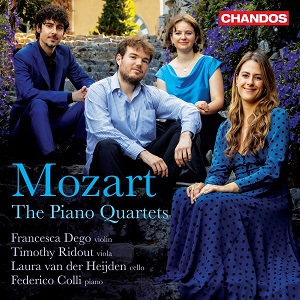
Wolfgang Amadeus Mozart (1756-1791)
Piano Quartet in G minor, K478 (1785)
Piano Quartet in E-flat major, K493 (1786)
Francesca Dego (violin), Timothy Ridout (viola), Laura van der Heijden (cello), Federico Colli (piano)
rec. 2022, Potton Hall, Dunwich, UK
Chandos CHAN20179 [68]
It must be said that these performances of two of Mozart’s greatest chamber works are very good. The minor irritants for me are tiny hesitations to underline expressive points, as just before the piano trill in the first entry (bar 4). I feel that the first movement of K478 should be relentless, dramatic, with an underlying, brooding tension tangible to a degree in even the quieter passages. I find this quartet’s apparent aim to create a wider expressive range counter-productive in this music. There is a slight fussiness at odds with the prevailing character. To my mind, a grim tension is essential. Both repeats are observed, and again I find the little decorations second time round redundant, even contrary to the severe element in this movement. Here and there the players create bulges on some longer notes – another modern trend in the name of supposed authenticity, which I gladly do without.
While on the subject of historical awareness, I should say there is minimal vibrato. Others may well disagree, but I think plain speaking with no frills works best in the Allegro. The central Andante suffers from a little too much rubato. In his opening bars, pianist Federico Colli sounds as though he cannot wait to inject some self-consciousness, and this easily turns precious. In the finale, too, there are moments where a suggestion of coyness is undesirable. Mini-hesitations do tend to have this effect, unfortunately.
In focussing on the caveats, I have perhaps tilted the balance too much. There is much to admire in these players’ execution; I just do not care for their interpretative approach. For those who find this style attractive or refreshing, this disc will be recommendable. I would rather turn to other recordings, among them pianist Dezső Ránki with Éder Quartet on Telefunken and Paul Lewis with Leopold String Trio on Hyperion.
Piano Quartet K493 fares better, but similar tendencies – navel-gazing and fiddly ornamentation – are soon apparent. The approach favours beauty and elegance, whereas to me the quartets convey a more robust Mozartian character. I wish the muscularity of the final bars of the first movement had been applied more generally. The Larghetto is immediately subjected to a little rubato, which I find disturbing. The ornamentation works much better here, but generally I would still have preferred less of what the booklet describes as Colli’s “highly imaginative and philosophical interpretations”. Normally I am a fan of highly imaginative musicianship, but here I believe a straightforward, instinctive approach is more likely to succeed. In the finale, I prefer more fresh air and joyfulness than these fine players choose to emphasise.
Michael O’Loghlin’s booklet notes are very thought-provoking. I enjoyed the insights into works which I thought I knew pretty well. The Chandos recording is beautifully warm and natural.
Philip Borg-Wheeler
Help us financially by purchasing from





















